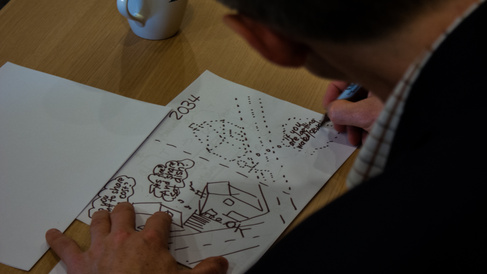
CSIC’s 2nd Workshop on Infrastructure Futureproofing was held at the Institute for Manufacturing (IfM) on 2nd April, 2014.
The workshop was organised by CSIC’s Dr Tariq Masood, Dr Jennifer Schooling and Professor Duncan McFarlane as part of CSIC's Futureproofing of Infrastructure project.
The scope of the workshop encompassed value and integration of futureproofing into asset management practice. This addressed the ability of infrastructure to be resilient to unexpected or uncontrollable events, eg those associated with climate change, and also the ability to adapt to required changes in structure and/or operations of the infrastructure in the future, eg expansion of capacity, change in usage mode or volumes.
The workshop aimed to:
- capture value / relevance of future-proofing in asset management
- determine challenges of future-proofing in whole-life asset management approaches
- consider appropriate methods/frameworks of future-proofing in asset management
- capture means of integrating future-proofing into asset management practice
The workshop gathered together senior advisors, directors, heads and lead engineers responsible for asset management, facilities management, government policies, built environment foresight and strategies to discuss current practices and how future proofing might be best used within them.
Delegates from London Underground, Costain, UCL, IBM, Crossrail, John Dora Consulting, Heathrow, Cementation Skanska, CIRIA, Network Rail, Arup, Highways Agency, Atkins, Halcrow/CH2M, Infrastructure UK and CSIC attended the workshop.
Professor Duncan McFarlane (CSIC) introduced the CSIC infrastructure futureproofing project. He explained futureproofing dimensions as i) resilience to unexpected / uncontrollable events and circumstances; and ii) capability to adapt or respond to changing needs, uses and capacities. He also presented views of participants of first workshop on futureproofing about this. He presented outputs from a 2014 CSIC study on finding futureproofing challenges and strategies for equipment assets. Then he talked on relevance of futureproofing in asset management also touching on ISO 55000 standards. Finally he presented on how to integrate futureproofing into asset management practice.
To view Duncan’s slides click here.
John Dora (John Dora Consulting), spoke on futureproofing infrastructure from flooding-related, disruptive events. He classified civil assets as railways, flood defence, navigation and legacy before talking about challenges related to ageing of infrastructure assets, design standards, capacity of system, value engineering, planning cycles, economics, party politics, terminology, systemic interdependencies, governance, weather and climate change. John also discussed key criteria of futureproofing from the first CSIC workshop and took rail examples of ‘TRaCCA’, especially assessing GIS-based evaluations of vulnerability.
John’s slides can be viewed here.
Andrew Ellis (Heathrow) spoke on futureproofing of Heathrow infrastructure. He talked about the Heathrow Masterplan to meet future demand forecast. The master planning includes runway, stand and terminal capacities, surface access and infrastructure e.g. heating, cooling, power, aircraft fuel systems, drainage, communication & IT and baggage. He talked about environmental, technological, political and economic factors that shaped the master plans.
Andrew’s presentation slides can be viewed here.
Keith Waller (Infrastructure UK) talked about infrastructure investment in the UK including National Infrastructure Plan and improving delivery and asset performance including infrastructure cost review. He also provided a draft infrastructure routemap overview. His proposed future challenges included recognizing increased levels of investment in economic infrastructure and demands for value for money, developing and delivering best practice and innovation.
Keith’s presentation slides can be viewed here.
Navil Shetty (Atkins) talked about ISO 55000 standards, relevance of futureproofing in asset management and futureproofing challenges. He defined futureproofing in asset management context and picked ISO 55001 standard clauses relevant to futureproofing. His proposed challenges related to futureproofing included: identifying appropriate time horizons, identifying key stakeholders and decision makers, balancing ‘long term risks’ against ‘near term need’, identifying sponsors, and how to make a business case.
Navil’s presentation slides can be viewed here.
Dr Jennifer Schooling (CSIC) facilitated two breakout sessions. During these sessions, the participants reviewed outcomes of the first workshop on futureproofing and held discussions to explore the value of futureproofing in asset management context.
Dr Ajith Parlikad (CSIC) also gave a presentation to update the industrial partners of the CSIC asset management projects. He presented on the CSIC asset management tools related to whole life value based decision-making, asset information requirements and information futureproofing strategy. He also presented on ongoing case studies with London Underground, Surrey County Council and Crossrail.
Ajith’s presentation slides can be viewed here.
A white paper is being written by CSIC, based on feedback from the two futureproofing workshops, to be published in the third quarter of 2014.
For further information, please contact Dr Tariq Masood (tm487@cam.ac.uk).
Notes:
Infrastructure futureproofing is “the process of making provision for future developments, needs or events that impact on particular infrastructure through its current planning, design, construction or asset management processes (McFarlane et al 2014)”.
Information futureproofing is “the process to ensure that required information is retrievable (reusable) throughout the whole lifecycle of infrastructure assets or product service systems when needed. The key characteristics of information futureproofing may include but not limited to representability, retrievability, reusability and accessibility (Masood et al 2013)”.
